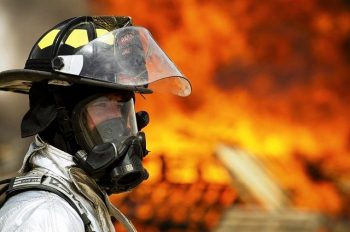A New Chinese Phrase Posted by Ayana on Mar 16, 2020 in News
How a modern term, created by a netizen on 2015, became a popular phrase honoring the new Chinese heroes fighting the epidemic.
On August 2015, a fire broke in the port of Tianjin. Firefighters (消防员 xiāo fáng yuán) at the site, unaware of to the hazardous chemicals contained at the warehouse, tried to extinguish the blaze when a series of massive explosions rocked the area. The explosions were so huge they were pick up by a Japanese satellite, and even registered as seismic events. The blast wave rippled out several kilometers from the port, but most of the casualties were among the thousand or so firefighters who were on the scene. 173 people were killed, most of them firefighters and police officers, and nearly 800 injured.
The next day, a Weibo user posted an old drawing, based on a picture taken four years earlier in Seoul. A car had exploded near Namsan Tunnel one afternoon on July 2011. People were evacuated (疏散 shū sàn) from the scene and directed to move outside the tunnel. One of them snapped a picture of the crowd walking through the tunnel in the same direction, depicting the back of only one: a firefighter heading to the scene. The picture is blurry, but the illustration highlighted the firefighter against a black and white background. You can see the illustration and the picture here.
The netizen who posted the illustration four years later, paying tribute to the brave people in the front line, added the caption: 世界上最帅的逆行 (shì jiè shàng zuì shuài de nì xíng). The first part of the sentence is easy to translate: 世界上最帅的 means the world’s most handsome. But the phrase 逆行 at the end of the sentence has no clear corresponding in English. The online Xinhua dictionary defines the word 逆 as: 方向相反,与“顺”相对 (fāng xiàng xiāng fǎn, yǔ “shùn” xiāng duì), meaning the opposite direction, antonym to the word 顺 (that means along). 行 means to walk, so together with 逆 it means to walk to the opposite direction. In the original picture the person on duty indeed walked in the opposite direction. While the crowed is being evacuated away from the car on fire and the danger, the firefighter, though, walks toward the flames, into the frontline.
Many were touched by the netizen’s tribute. The illustration has been shared endlessly on Weibo. And the famous caption became a widespread phrase 最美的逆行者 (zuì měi nì xíng zhě), to describe those who in event of danger ignore their safety and head to the front line (前线 qián xiàn) to save peoples’ lives. It became prevalent during the 2015 Tianjin explosions, in spoken language, and in the Chinese media, as well (in this article, for example) when referring to the firefighters and policemen.
Lately, the phrase has become popular again. It is used to praise the medical staff (医护人员 yī hù rén yuán) who travel to the epicenter of Wuhan, to fight the new epidemic. Four young female doctors, for example, who headed last January to Hubei to help, were praised in an article as 最美的逆行者, for 奔赴疫情前线 (bēn fù yì qíng qián xiàn, rushing to the frontline of the epidemic). In the beginning of February, a group of 350 medical staff from Shanghai was sent to Wuhan. The author of the article concluded: 我们向每一位“最美逆行者”致敬 ( wǒ men xiàng měi yī wèi “zuì měi nì xíng zhě” zhì jìng, we salute all the brave heroes). A new book by the title 最美逆行者2020 covers the stories of some of these heroes fighting (抗击 kàng jī) the epidemic.
Wang Yi, China’s Minister of Foreign Affairs, has used this term in the speech he delivered on February 15 at the 56th Munich Security Conference:
两万多名医护人员从全国各地向湖北重灾区集结,被誉为当代“最美逆行者”。
Liǎng wàn duō míng yī hù rén yuán cóng quán guó gè dì xiàng hú běi zhòng zāi qū jí jié, bèi yù wèi dāng dài “zuì měi nì xíng zhě”.
Over 20,000 healthcare workers converged in Hubei, the hardest hit province, from across the nation, hailed as heroes in harm’s way.
Text vocabulary
消防员 xiāo fáng yuán = firefighter
疏散 shū sàn = to evacuate
世界 shì jiè = world
方向 fāng xiàng = direction
疫情 yì qíng = epidemic
前线 qián xiàn = front line
医护人员 yī hù rén yuán = medical staff
致敬 zhì jìng = to salute, to pay tribute to
抗击 kàng jī = to resist, to fight back
大家都健康平安!

Build vocabulary, practice pronunciation, and more with Transparent Language Online. Available anytime, anywhere, on any device.





Leave a comment: